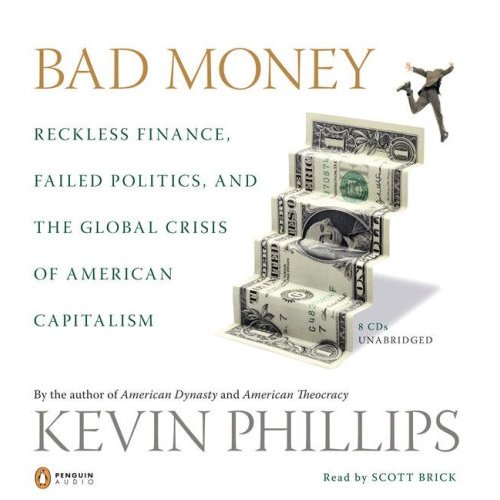You are here
Bad Money: Reckless Finance, Failed Politics, and the Global Crisis of American Capitalism (2008) [audiobook+ebook]
Primary tabs
| Size | Seeds | Peers | Completed |
|---|---|---|---|
| 191.53 MiB | 1 | 0 | 139 |

.
Released in April 2008, a full 6 months before the staggering events of October, when the arch criminals of Wall Street held the U.S. government for ransom, threatening to crash the global economy if they weren't given trillions in bailout money, Bad Money lays out exactly who created the "crisis" for their own benefit, and why they needed to. The level of prescience in this book is stunning.
The criminals responsible for easily the largest financial crime in world history, their sycophants in the corporate press and the pundits they relied on to legitimize their lies, claimed that nobody could have predicted the catastrophe that wiped out trillions of peoples' savings while giving trillions to the banks which will be paid for by taxing future generations. This book proves otherwise in excruciating detail.
Phillips and many others were sounding the alarm, documenting the staggering depth and volume of crime occurring in every sector of the financial system. To this day the crisis is blamed on a few bad mortgages made to unqualified borrowers, but this book proves that to be a lie, well before the "crisis" was triggered.
__________________________________
In his acclaimed book American Theocracy, Kevin Phillips warned of the perilous interaction of debt, financial recklessness, and the spiking cost (and growing scarcity) of oil- warnings that are proving to be frighteningly accurate. Now, in his most significant and timely book yet, Phillips takes the full measure of this crisis. They are a part of what he calls "bad money"- not just the depreciated dollar, but also the dangerous attitudes and the flawed products of wayward mega-finance. His devastating conclusion: In its hubris, the financial sector has hijacked the American economy and put our very global future at risk-and it may be too late to stop it. -- Amazon review, April 2008
Praise for Bad Money
“Kevin Phillips’ new book, Bad Money: Reckless Finance, Failed Politics, and the Global Crisis of American Capitalism, would be sobering enough if it were the first we’d ever heard from him. When you take into account how often he’s been right in the past, this fourteenth volume in his continuing commentary on the American condition becomes positively alarming.”
—Tim Rutten, Los Angeles Times
“Bad Money is a short book by a practiced artist who specializes in identifying the defining trends of American life. Here Kevin Phillips takes on financial practice in the age of Robert Rubin, Henry Paulson, and the global rule of Goldman Sachs. It’s not meant to be pretty and it isn’t. . . . This is an important book. It ranges with stunning clarity over terrain that most political writing, including that of the most prominent voice of the American left, simply ignores.”
—James K. Galbraith, The Texas Observer
“At a time when the Cassandras of finances are looking like realists, there is no gloomier prophet than Kevin Phillips. The author of thirteen previous books, including at least one classic, The Emerging Republican Majority, Mr. Phillips sees a perfect economic storm coming. . . . His warnings have to be taken seriously.”
—Barry Gewen, The New York Times
“A financial policy horror story . . . Kevin Phillips, right so often before, castigates both parties for bad times.”
—The Philadelphia Inquirer
“Comes now Kevin Phillips, mighty sage of the political economy, that gray area spanning elections, growth and geography, to condemn the financial services industry. With a recession at the gates, Phillips’s previous record as Republican strategist turned skeptic gives Bad Money the gravity sure to guide the conversation about what is to be done.”
—Ross Kerber, The Boston Globe
“A pretty grim portrait of the financial services sector and its present role in the American economy.” —Tom Acitelli, The New York Observer
______________________________________
Yet another ConCen Original® lovingly chapterized and size optimized just for you!
Includes a PDF of the second edition, written in 2009 as the horror of the financial crisis was still unfolding, but still far from its lowest point. It has a revised preface and an afterword absent from the first edition.
- Log in to post comments
